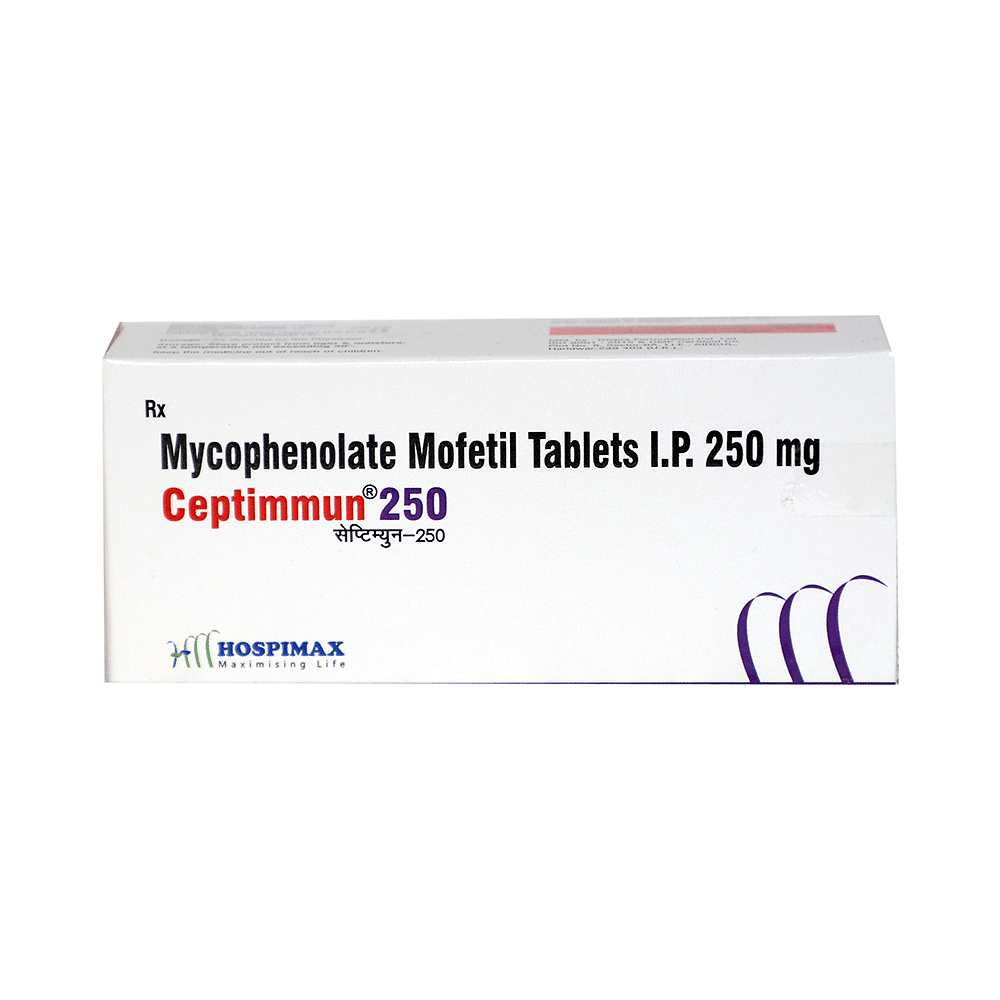
Convotos 250mg Tablet
Manufacturer
Akognos Life Sciences
Salt Composition
Mycophenolate mofetil (250mg)
Key Information
Short Description
Convotos 250mg Tablet is an immunosuppressant used to prevent organ rejection after a transplant, such as kidney, heart, or liver.
Dosage Form
Tablet
Introduction
Convotos 250mg Tablet belongs to a group of medicines called immunosuppressants. It is used with other medicines to prevent your body from rejecting an organ (such as a kidney, heart, or liver) after a transplant. It works by suppressing your body’s immune system so that it does not attack the new organ.
Directions for Use
Take this medicine in the dose and duration as advised by your doctor. Swallow it as a whole. Do not chew, crush or break it. Convotos 250mg Tablet is to be taken with food.
How it works
Convotos 250mg Tablet is an immunosuppressant. It reduces the action of the body's own defense system (the immune system) and prevents rejection of the transplanted organ.
Quick Tips
Your doctor has prescribed Convotos 250mg Tablet to stop your body from rejecting a transplanted organ (e.g. kidney, heart or liver). It may take 6 to 12 weeks for Convotos 250mg Tablet to start working. Keep taking it as prescribed. It may cause birth defects so birth control is required in females with reproductive potential. It makes you more susceptible to getting infections. Avoid contact with people who have an infection. Consult your doctor immediately if you develop a sore throat, high temperature, or any other signs of infections. Protect yourself from direct sunlight by wearing protective clothing and applying a sunscreen with a high sun protection factor (SPF). Take it with food to minimize possible side effects like nausea and stomach pain. Your doctor may get regular blood tests done to monitor the levels of blood cells in your blood. Inform your doctor if you experience symptoms such as unexplained bruising or bleeding, sore throat, mouth ulcers, or fever.
Related Medicines

Cellmune 250mg Tablet

Mofilet 250 Tablet

Mycosan M 250mg Tablet

Myotec 250mg Tablet

Ceptimmun 250 Tablet

Biomyf 250mg Tablet

Fenograf 250mg Tablet

Mycofit 250mg Tablet

Fenomune 250mg Tablet

Manocept 250mg Tablet
Frequently asked questions
Can Convotos 250mg Tablet cause cancer?
Convotos 250mg Tablet may increase the risk of certain cancers like skin cancer and lymphoma (cancer of the lymph system). Protecting yourself from sunlight when outdoors is essential, consider wearing protective clothing and applying sunscreen to minimize this risk. Consult your doctor if you experience any new skin sores, changes in mole size or color, brown or black skin lesions with uneven edges, or a sore that doesn't heal properly. If you also experience unexplained fever, persistent fatigue without resolution, weight loss, or pain or swelling in the neck, groin, or armpit areas, inform your doctor immediately.
Why has my doctor given me Convotos 250mg Tablet after I have had a kidney transplant?
Convotos 250mg Tablet is an immunosuppressant medication. It helps your body accept the donated kidney by suppressing the cells of your immune system, which fights foreign substances and could reject them. This allows for better organ acceptance.
Is Convotos 250mg Tablet a steroid or chemotherapy medicine? Can it cause hair loss?
Convotos 250mg Tablet is neither a steroid nor a chemotherapy medication. It's an immunosuppressant that weakens your immune system to prevent organ rejection after transplantation. Hair loss is a common side effect of Convotos 250mg Tablet.
Do I need any special tests while taking Convotos 250mg Tablet?
Because Convotos 250mg Tablet can impact blood count, kidneys and liver function, your doctor may request a blood test before starting treatment. Regular blood tests will be recommended to monitor the medication's effect on your body. These tests help track your response and assess any side effects.
My doctor has asked me to stay away from a person who has chickenpox or shingles. Why?
Convotos 250mg Tablet is an immunosuppressant that weakens your immune system, making you susceptible to infections. If you come in contact with a patient of chickenpox or shingles, you may develop them too. This is the reason why your doctor has advised you to be cautious.
What precautions should a female follow while taking Convotos 250mg Tablet?
Do not take Convotos 250mg Tablet if you are pregnant or plan to become pregnant. It carries a high risk of miscarriage during the first three months of pregnancy and can potentially cause birth defects in the newborn. Therefore, it is crucial to use two forms of reliable contraception together for four weeks before treatment starts, during the duration of treatment, and for six weeks after stopping Convotos 250mg Tablet. Using a second form of contraception along with birth control pills can improve the effectiveness of birth control as Convotos 250mg Tablet may decrease their effectiveness.
What precautions should a male follow while taking Convotos 250mg Tablet?
Men and their partners are advised to use reliable contraception during treatment, including for the following 90 days after the treatment. During therapy, men should avoid donating semen for the duration of treatment.


